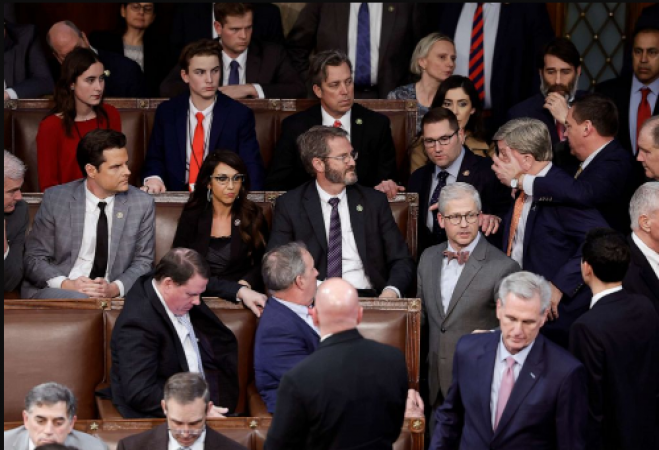
USA: After lengthy Republican negotiations, House Speaker Kevin McCarthy, R-Calif., emerged with gavel in hand on Saturday, but the concessions he made have raised worries about a possible economic crisis later this year.
According to economists and budget experts who spoke with ABC News, the recent empowerment of far-right House members has increased the likelihood of contentious, high-stakes negotiations over how the federal government should pay for past debts and allocate future spending.
Failure to reach a deal prior to the deadlines that are rapidly approaching would rock the financial markets, raise interest rates at a time when high borrowing costs already restrain economic activity, and all but guarantee a recession, they added.
Also Read: PM lauds India's strong macroeconomics, 'bright spot' in global economy
A debt-limit increase that permits the U.S. government to borrow money for past expenses, ensuring that the country continues to pay its creditors what it owes, and a budget that keeps the government funded for the upcoming fiscal year must be passed by Congress within months if the country is to avoid economic disruption.
The conservative Republican group that influenced the speaker vote has stated that it will not raise the debt ceiling unless Democrats agree to significant spending cuts. The Biden administration, however, has stated that it will not engage in policy discussions if the annual borrowing increase is a condition.
A government shutdown that halts some federal payments could result from the sharp spending cuts proposed by some Republicans, according to economists and budget experts.
The events of the previous week are quite troubling, according to Shai Akabas, the Bipartisan Policy Center's director of economic policy. It will be more challenging to pass legislation than usual, and it is never simple when there is a divided government to begin with.
It poses a serious risk to both the American economy and people's financial security, he continued.
Also Read: Indian Diaspora's Remittances rose by 12 pc to USD 100-Bn in 2022: Sitharaman
Debt ceiling: Republican disagreements over McCarthy centred in part on how the party views the nation's debt ceiling, or the maximum amount of money that the United States may borrow to pay off its debt.
The United States has accumulated tens of trillions of dollars in debt as a result of annual federal spending that exceeds tax revenue, necessitating ongoing payments in order to avoid defaulting on outstanding loans. The U.S. Treasury can then raise the amount it can borrow thanks to a law that Congress approves every year. The debt-limit increase has occasionally become a political flashpoint, sparking discussions about the nation's fiscal responsibility. Congressional Republicans, for example, put pressure on then-President Barack Obama to accept some spending cuts in order to win their support for a debt-limit hike.
According to a report from the left-leaning think tank Third Way, a default on U.S. debt could result in the loss of 3 million jobs, an average increase of $130,000 in the cost of a 30-year mortgage, and a $20,000 reduction in 401(k) savings for the average worker nearing retirement.
"We're almost certain to send the economy into a recession if we exceed the debt ceiling for any length of time," Zach Moller, Third Way's director of the economic programme,
Governmental impasse: The federal government will need to come to an agreement on how it should distribute funds for the upcoming fiscal year, which starts in October, in addition to paying its prior expenses. The U.S. government will shut down if Congress does not pass a budget by then, as agencies struggle to maintain government programmes and pay federal employees. Right-wing Republicans have called for significant reductions in government spending that would put the country on track to achieve budget parity in ten years.
McCarthy has vowed to support drastic cuts, including a reduction in entitlement programmes like Medicare and Social Security, which are pillars of financial security for many older Americans, as part of concessions made to the conservative faction, according to the New York Times.
Since lawmakers have not yet presented a detailed plan, economists and budget analysts said that spending reductions on the scale demanded by far-right Republicans would drastically curtail federal programmes.
Also Read: Crude falls: Frontline and Euronav scrap $4.2 billion merger
According to Maya MacGuineas, president of the Committee for a Responsible Federal Budget in Washington, which promotes fiscal responsibility through spending reductions and tax increases, "balancing the budget in 10 years is too heavy a lift to be a serious policy proposal."
In the meantime, if Congress is unable to come to an agreement on a budget and the government shuts down, the unrest could have a significant impact, leading to the closure of some national parks and reductions in services like processing passports.
Shutdowns aren't disastrous, she said, just disruptive.